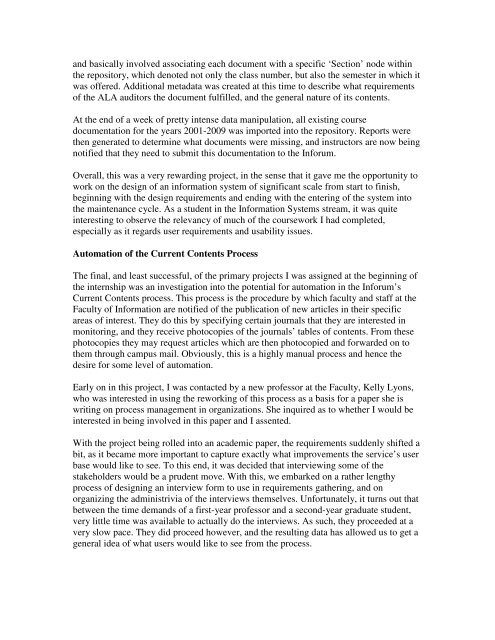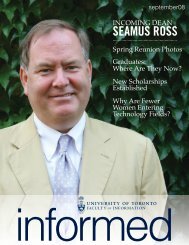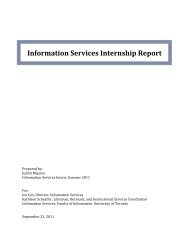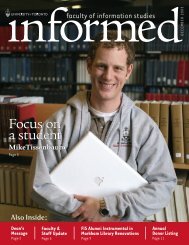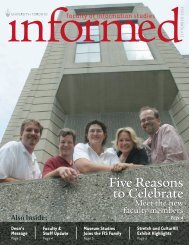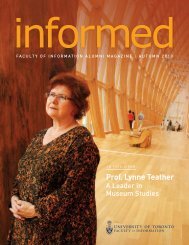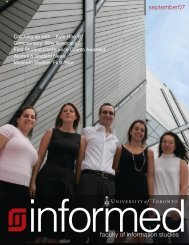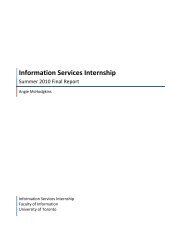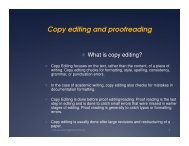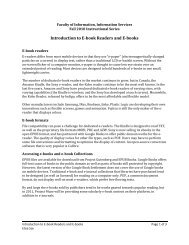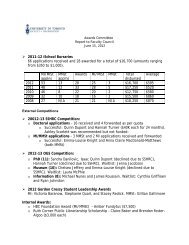Steve Marks, MISt - Faculty of Information - University of Toronto
Steve Marks, MISt - Faculty of Information - University of Toronto
Steve Marks, MISt - Faculty of Information - University of Toronto
Create successful ePaper yourself
Turn your PDF publications into a flip-book with our unique Google optimized e-Paper software.
and basically involved associating each document with a specific ‘Section’ node within<br />
the repository, which denoted not only the class number, but also the semester in which it<br />
was <strong>of</strong>fered. Additional metadata was created at this time to describe what requirements<br />
<strong>of</strong> the ALA auditors the document fulfilled, and the general nature <strong>of</strong> its contents.<br />
At the end <strong>of</strong> a week <strong>of</strong> pretty intense data manipulation, all existing course<br />
documentation for the years 2001-2009 was imported into the repository. Reports were<br />
then generated to determine what documents were missing, and instructors are now being<br />
notified that they need to submit this documentation to the Inforum.<br />
Overall, this was a very rewarding project, in the sense that it gave me the opportunity to<br />
work on the design <strong>of</strong> an information system <strong>of</strong> significant scale from start to finish,<br />
beginning with the design requirements and ending with the entering <strong>of</strong> the system into<br />
the maintenance cycle. As a student in the <strong>Information</strong> Systems stream, it was quite<br />
interesting to observe the relevancy <strong>of</strong> much <strong>of</strong> the coursework I had completed,<br />
especially as it regards user requirements and usability issues.<br />
Automation <strong>of</strong> the Current Contents Process<br />
The final, and least successful, <strong>of</strong> the primary projects I was assigned at the beginning <strong>of</strong><br />
the internship was an investigation into the potential for automation in the Inforum’s<br />
Current Contents process. This process is the procedure by which faculty and staff at the<br />
<strong>Faculty</strong> <strong>of</strong> <strong>Information</strong> are notified <strong>of</strong> the publication <strong>of</strong> new articles in their specific<br />
areas <strong>of</strong> interest. They do this by specifying certain journals that they are interested in<br />
monitoring, and they receive photocopies <strong>of</strong> the journals’ tables <strong>of</strong> contents. From these<br />
photocopies they may request articles which are then photocopied and forwarded on to<br />
them through campus mail. Obviously, this is a highly manual process and hence the<br />
desire for some level <strong>of</strong> automation.<br />
Early on in this project, I was contacted by a new pr<strong>of</strong>essor at the <strong>Faculty</strong>, Kelly Lyons,<br />
who was interested in using the reworking <strong>of</strong> this process as a basis for a paper she is<br />
writing on process management in organizations. She inquired as to whether I would be<br />
interested in being involved in this paper and I assented.<br />
With the project being rolled into an academic paper, the requirements suddenly shifted a<br />
bit, as it became more important to capture exactly what improvements the service’s user<br />
base would like to see. To this end, it was decided that interviewing some <strong>of</strong> the<br />
stakeholders would be a prudent move. With this, we embarked on a rather lengthy<br />
process <strong>of</strong> designing an interview form to use in requirements gathering, and on<br />
organizing the administrivia <strong>of</strong> the interviews themselves. Unfortunately, it turns out that<br />
between the time demands <strong>of</strong> a first-year pr<strong>of</strong>essor and a second-year graduate student,<br />
very little time was available to actually do the interviews. As such, they proceeded at a<br />
very slow pace. They did proceed however, and the resulting data has allowed us to get a<br />
general idea <strong>of</strong> what users would like to see from the process.


